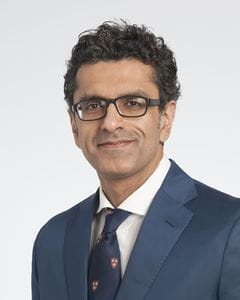INDIANAPOLIS—A new observational study of 141,000 patients suggests physicians should consider a different approach to treating one type of heart attack in patients with chronic kidney disease (CKD). Led by Ankur Kalra, MD, from Indiana University School of Medicine, the study was recently published in the Journal of the American Heart Association.
The study–the largest of its kind–is drawn from a nationwide readmission database of patients with CKD who suffer a “non-ST segment elevation myocardial infarction,” or NSTEMI. Kalra and his team found these patients may benefit from a treatment approach called “early invasive strategy,” which has long been thought to be too risky for people with CKD. Additionally, patients with CKD have historically been excluded from randomized clinical trials exploring the more invasive strategy, leading to a lack of data on the best way to treat NSTEMIs in this population.
“These findings are important because they show that the benefits of offering invasive therapy to these patients upfront outweigh the risks,” said Kalra, who is an associate professor of clinical medicine at the IU School of Medicine Department of Medicine and medical director of interventional cardiology quality and innovation at the Cardiovascular Institute. “This study will influence decision-making by physicians and the development of treatment guidelines for NSTEMI in this population of patients.”
As suggested by the name, the invasive strategy–the typical treatment for people who have had NSTEMIs–is aggressive and generally involves a diagnostic angiogram followed by revascularization through stenting or open-heart surgery. But Kalra said many physicians have been reluctant to pursue this strategy for patients with CKD due to a perception of increased risk for adverse events, such as bleeding or acute kidney injury caused by the dye used during an angiogram. In deference to these concerns, patients with CKD are instead usually offered an alternative approach referred to as “medical management,” which entails a dye-free echocardiogram and a prescription for aspirin, statin and beta blockers.
Kalra said this study suggests medical management may be too conservative, and CKD patients are being disadvantaged by not being offered the more aggressive strategy. Researchers found no strong association between invasive therapy and acute kidney injury, and patients treated with this approach had lower mortality, lower risk of cardiac and cerebrovascular adverse events and lower need for revascularization through stenting or surgery.
“This is a challenging population to treat, and individualized care is important,” Kalra said. “But our results suggest that invasive therapy should be offered to all patients in this category.”
###
IU School of Medicine is the largest medical school in the U.S. and is annually ranked among the top medical schools in the nation by U.S. News & World Report. The school offers high-quality medical education, access to leading medical research and rich campus life in nine Indiana cities, including rural and urban locations consistently recognized for livability.




